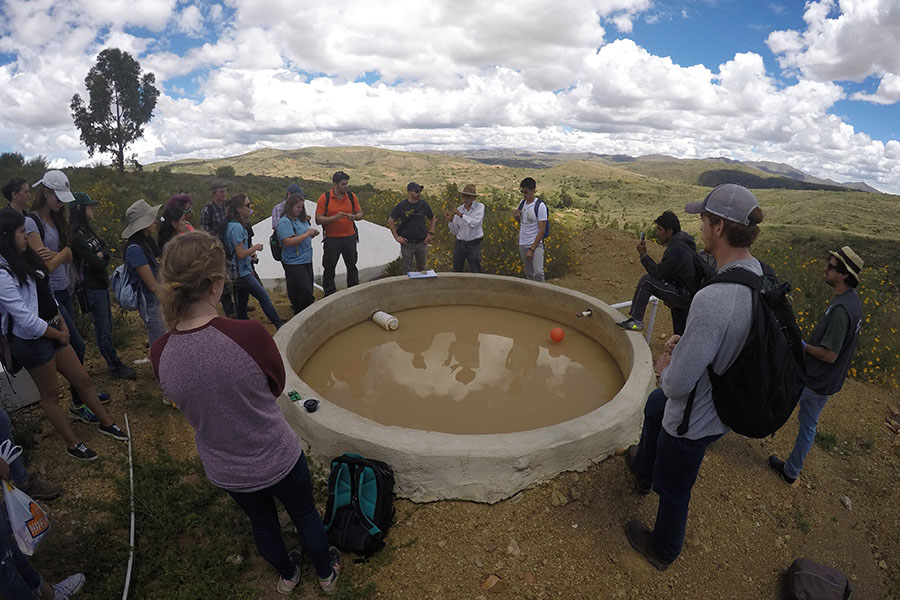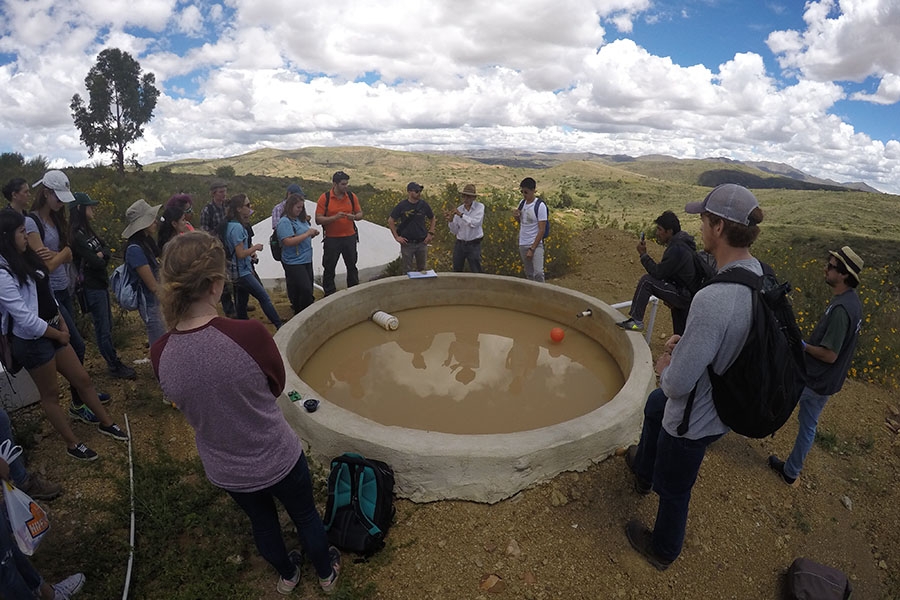 Students learn about a rainwater collector in the El Campo community from a local engineering during their Spring Break research trip to Bolivia. The trip, part of the Environmental Technology in the Developing World class, included days of collecting water samples and surveying residents as well as days learning how rural communities have developed their own water systems. Four of the students on the trip sat down together to talk about the trip's impact on them for the School's Field Notes podcast. (Photo: Donald Smith) |
A dozen School of Civil and Environmental Engineering students will travel to New York this weekend to present their findings from a recent research trip to Bolivia.
We’re not talking graduate students who’ve been doing research for months or years. No, this is a group of undergrads who spent just over a week abroad as part of a course they’ve been taking with Joe Brown called Environmental Technology in the Developing World.
And while they collected mountains of data about water quality and helped pilot a data-collection approach for the 200 Cities Project, they also came back to campus with new ideas about their futures and the ways they can make the world a better place.
“Before this trip, I had a very clear direction of where I wanted to go. I wanted to graduate, I wanted to get a job, working on getting my [professional engineer] license, and so on and so forth,” said Riley Poynter, a junior in civil engineering. “Now, I think my future’s a lot more unknown. … I’m still in the process of reflecting on this trip and knowing where to go from there, but just knowing that I want to have a service attitude as I get my degree — like our CEE catchphrase, ‘people are our priority and the world is our laboratory,’ [I want to figure] out how that is true.”
Poynter was one of four students who sat down to talk about what the trip to Bolivia accomplished for a new episode of the School’s Field Notes podcast, which is now available for download or streaming on Soundcloud.
“It was an honor to be [in Bolivia], even if just for a week, to be able to work with other students who are so intelligent,” said Donald Smith, a civil engineering senior. “It’s an honor for them to invite us over to their country and to help work on these critical problems in their community.”
The group collected water samples at 80 locations across Cochabamba, Bolivia, and surveyed residents about their water. The approach was a trial run for a project that tracks the development of 200 cities around the globe to better understand urban expansion and its effects. The project will use the students’ results to plan how to collect water-quality data in other communities.
They also discovered a contamination problem in a community called San Pedro, where the group tested the local wells and household tap water. Preliminary testing found E. coli bacteria in tap water but not in the wells. In that community, the students learned about the wastewater treatment plant residents built themselves to reduce the waste they were dumping into local waterways. And students gathered water samples to help find ways to improve the facility.
All of their work was in concert with engineering students from a local university and other local collaborators.
“We were able to build a lot of relationships — even though we were only there for a short time — through the engineering work that we did,” said biology major Ann Johnson, who was also part of the class and developed a water-testing approach the students used.
She said she’s always wanted to go to medical school and work in global public health. She thought being a doctor would be the best way to make a difference in individual lives and become part of a community in the developing world. But now: “[This trip has] made me think, not that I don’t want to go to medical school, but maybe [I could be] considering other options now that I see there are other ways to become a really good part of the community and build relationships.”

